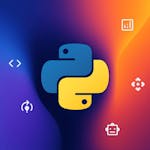Why learn Python?
Python is a popular general purpose programming language used for both large and small-scale applications. With Python, you can discover how to bridge web development and data analytics. Python’s widespread adoption is due to its large standard library, easy readability, and support of multiple paradigms such as functional, procedural and object-oriented programming styles. Python modules interact with a variety of databases, making it an excellent choice for large-scale data analysis.The Python programming language is often the best choice for introductory courses in data science and machine learning. If you've been wondering how to learn python online to advance your career, you've come to the right destination.
Python jobs
A quick search of Indeed.com returns over 40,000 job openings with Python programming skills or experience listed as a requirement. The wide adoption of the language across many industries results in a large number of job opportunities. Common job titles include Python Developer, Python Software Engineer, Full Stack Developer and Python Database Programmer. Of the Python-specific jobs listed, 43% of offered salaries are above $100K per year, and some senior-level Python programming engineer positions offer over $200K per year. It’s very fair to say that Python skills and experience can lead to a lucrative and secure career. The proper Python certification can influence hiring managers looking to fill specific roles on their team.
Is Python a good programming language to learn?
Following is an excerpt from a Coursera Community forum topic about what programming languages our Community members use.
"I've been in software development for 50 years (now retired) and languages come and go. If you're into software development, keep active in several, and strive to learn a new and different culture language every year or two. In simple terms today I like Python and JavaScript. For longevity in marketable skills, C and C++ are essential base skills. I used C for over 30 years. Learn Haskell, it'll improve all your other programming skills even if you never use it in a project." - Gordon
"For data science it is most important to understand and implement algorithms. Python is one of the languages that is really self describing. And one of the major reasons why I use it for data science projects especially machine learning is that it is very light. Anyway, for all my projects that have complicated algorithms, I use OCTAVE for trying out algorithms(since I have all datascience codes stored there). Mainly by breaking it into simpler problems and then in end I convert it into desired language and join the simpler and shorter algorithms." - Hardi
Popular Categories on Coursera: Business | Computer Science | Data Science | Information Technology | Health | Career Success | Free Courses | Guided Projects | See All
Popular Degrees on Coursera: Business Degrees | Computer Science Degrees | Data Science Degrees | Public Health Degrees | Bachelor’s Degrees | Master’s Degrees | See all online degrees on Coursera
Popular Professional Certificates on Coursera: Google IT Support Certificate | IBM Full Stack Development Certificate | Facebook Social Media Marketing Certificate | See all professional certificates on Coursera
Popular MasterTrack Certificates on Coursera: Social Work: Practice, Policy, and Research Certificate | Instructional Design Certificate | Machine Learning for Analytics Certificate | See all MasterTrack certificates on Coursera





